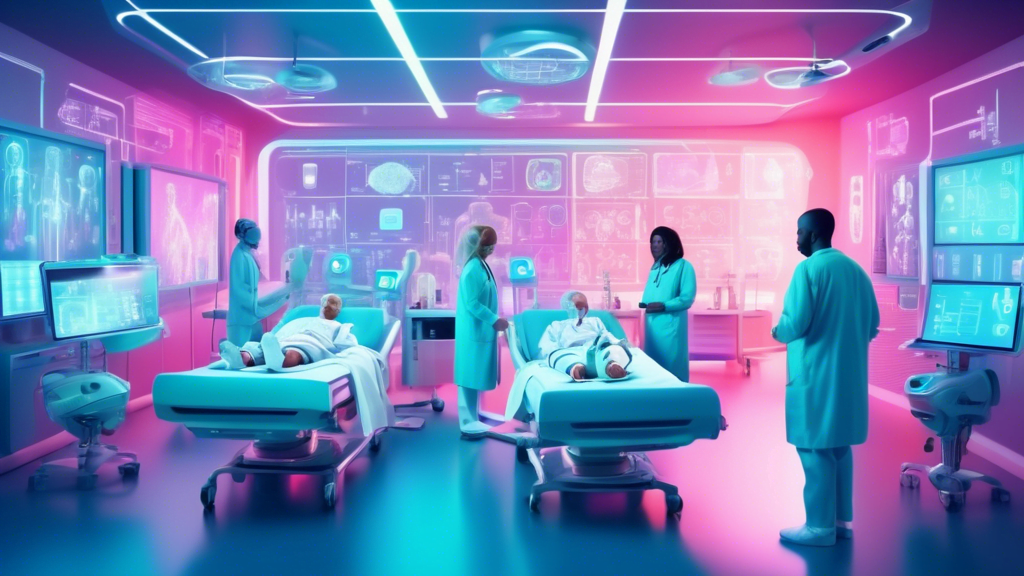How AI is Transforming Patient Monitoring: A Peek Into the Future of Healthcare
Remember the last time you went to the hospital or visited a clinic? You might have noticed how nurses and doctors constantly check on patients, update records, and monitor various health metrics. What if I told you AI is stepping up to make these routines more efficient and far-reaching? Yes, you heard that right! AI in patient monitoring isn’t just a fancy buzzword but a pivotal gear in the healthcare machine, enhancing both patient care and healthcare workers’ productivity.
AI Makes Its Way Into Hospitals
I had an eye-opening encounter with AI in healthcare during a routine check-up last year. As the nurse hooked me up to the monitor, she explained that the system uses AI to track and predict vital signs, providing alerts if something goes awry. I was amazed! Right there, nestled in the myriad of beeps and numbers, was a sophisticated AI quietly crunching data to safeguard my health. Isn’t it fascinating how technology has the prowess to potentially save lives by making predictions based on past health records and real-time data?
But how exactly does AI make sense of all these complex datasets? Well, AI algorithms, trained on thousands of patient records, can detect patterns that are imperceptible to humans. These algorithms can forecast potential health issues even before they become evident through symptoms. Have you ever wondered how these advancements could decrease the rate of medical emergencies?
Real-Life Benefits of AI in Patient Monitoring
Let’s dive deeper with an example. Imagine a patient with a heart condition; AI-enabled devices can continuously monitor heart rate, blood pressure, and other vitals, alerting healthcare staff instantly if something unusual is detected. This immediate response capability can literally be the difference between life and death.
Moreover, AI shines in managing chronic conditions, like diabetes. Devices equipped with AI can analyze blood sugar levels over time, suggest diet or medication adjustments, and even predict potential spikes or drops. Here, AI doesn’t just monitor; it acts as a proactive guardian of the patient’s health.
AI and the Everyday Technology of Patient Care
The integration of AI into everyday devices goes beyond the walls of hospitals. Wearable technology, such as smartwatches and fitness bands, are now equipped with sensors that monitor health metrics in real time. These gadgets communicate data directly to healthcare providers. Have you ever noticed your smart device buzzing you to move a bit more or congratulating you on reaching your heartbeat or exercise goals?
Here’s a lighter twist to AI’s role in healthcare: it doesn’t always get things right. Prepare to chuckle—once, my smartwatch vibrated frantically during a scary movie, mistaking my elevated heart rate as a sign of physical exercise rather than my response to the movie’s terrifying antagonist!
Optimizing AI Features for Enhanced Patient Care
While AI’s benefits in patient monitoring are clear, optimizing these AI features involves both technological adoption and human oversight. Users and healthcare providers must ensure that AI tools are used responsibly, understanding their capabilities and limitations. It’s crucial to have regular updates and checks on these AI systems to adapt to new health threats and evolving medical knowledge bases.
To all users of such AI-powered devices and systems: always maintain open communication lines with your healthcare provider. Reporting any discrepancies or irregularities noticed by AI can help in fine-tuning the technology even further.
Concluding Thoughts
AI’s role in patient monitoring exemplifies just how profound and transformative technology can be in our lives, especially in domains critical like healthcare. While it offers exciting possibilities, the journey of integrating, optimizing, and trusting AI in our daily medical routines continues. It’s a partnership where technology meets humanity, leading to potentially unprecedented outcomes in the quality of patient care. So next time your device or hospital monitor beeps, remember, it’s more than just a machine—it’s the future of healthcare knocking on the door of the present.
